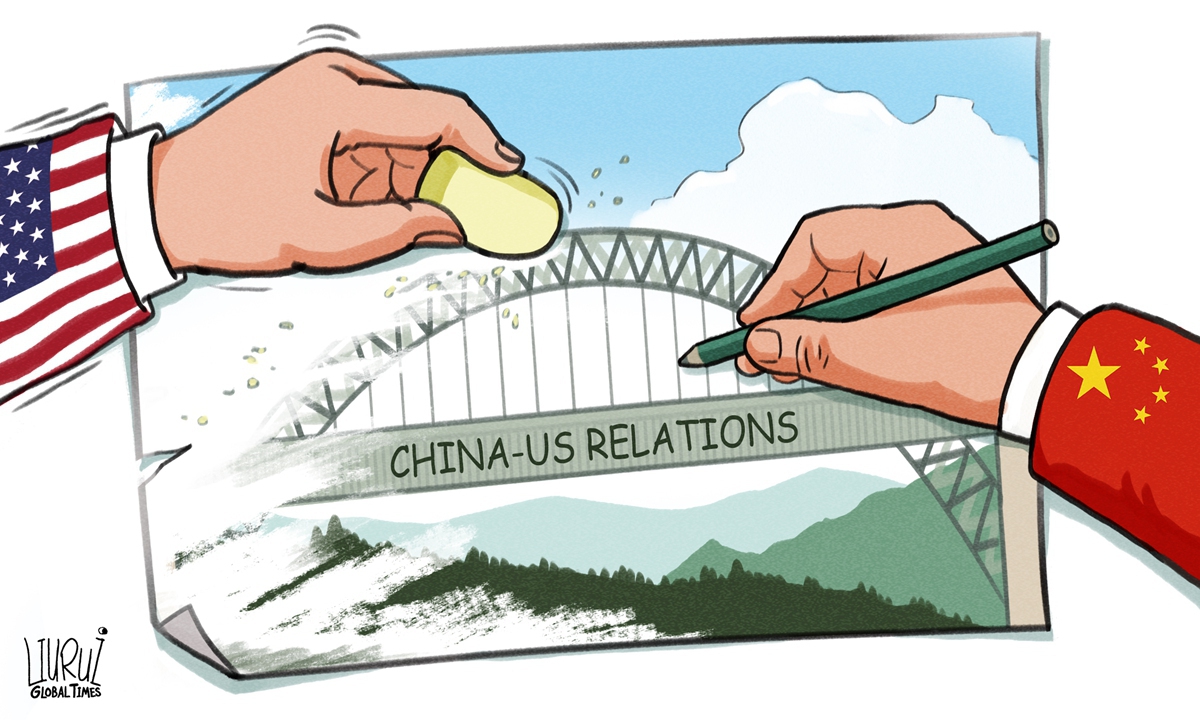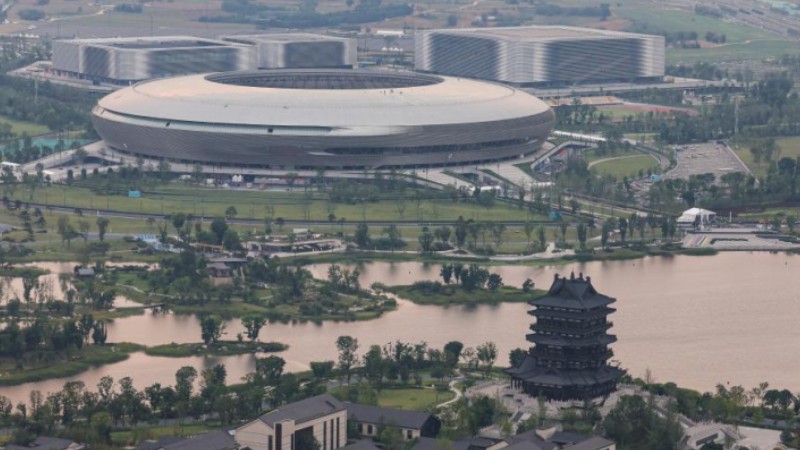US Congress members' provocation on Taiwan question 'may interrupt Washington's attempt' to engage China

China-US relationship. Illustration: Liu Rui/GT
After US Secretary of State Antony Blinken's visit earlier this month, Washington's senior diplomats and officials are keeping in touch with their Chinese counterparts to seek further engagement, including a reported trip to China in July by Secretary of the Treasury Janet Yellen, but all these attempts might be derailed by some US politicians, as their provocations on the Taiwan question and moves to push "decoupling" will make it difficult to stabilize the China-US tension, Chinese analysts said on Wednesday.
A US bipartisan congressional delegation led by House Armed Services Committee Chairman Mike Rogers landed in Taiwan on Tuesday for a three-day visit, according to the American Institute in Taiwan, CNBC reported. The delegation was scheduled to meet with Tsai Ing-wen, the regional leader of the island, on Wednesday.
The visit comes at a sensitive time for China-US relations. Rogers' visit to Taipei comes as the Biden administration is taking several steps aimed at stabilizing the bilateral relationship with China, which reached a low point in February, after the balloon incident, according to CNBC.
At the same time, some Republicans are urging Blinken not to renew the "Agreement between the United States and the People's Republic of China on cooperation in science and technology" (STA), a four-decade-old agreement between the US and China that provides for scientific and technological cooperation, according to US media outlet the National Review on Tuesday.
These moves show that many hostile forces and politicians within the US are trying to damage the China-US relationship even further rather than stabilizing and managing the tense situation, but while the Biden administration is asking for further engagement with China, it does not show enough sincerity to balance these negative impacts, said experts.
According to US media, Yellen plans to visit Beijing in early July for the first high-level economic talks with her new Chinese counterpart, Bloomberg reported on Tuesday, citing people familiar with the scheduling.
On Tuesday, Chinese Ambassador to the United States Xie Feng spoke on the phone with US Deputy Secretary of State Wendy Sherman, according to the website of the Chinese embassy, but no information about visits of senior officials was mentioned.
Ni Feng, director of the Institute of American Studies of the Chinese Academy of Social Sciences, told the Global Times on Wednesday that "Blinken's trip was not to repair the damaged China-US ties, but to seek communication to make sure there was no loss of control over bilateral relations. So it's natural that the US is continuing its provocations and even pushing forward confrontation and decoupling in some fields."
Li Haidong, a professor at China Foreign Affairs University, said that "China wants to stabilize the bilateral relations, but unfortunately, it seems like the US, whether its politicians in Congress or in the White House, wants to ensure that China-US relations continue to worsen and are muddying their efforts to stop this dangerous trend."
The US strategy on China has been finalized, so just like the past, seeking engagement with China will not affect their provocations against China, and China will not expect the US to completely stop provocations and confrontations, Ni said. "For China, we can just retaliate against them [the US] when we must, and talk to them when it's necessary."
Latest provocation
The Taiwan question is the most sensitive topic of the China-US relations, and China always fights back when the US provokes. The bipartisan delegation of US Congress members led by Rogers to the island of Taiwan, is definitely a provocation that could further destabilize the China-US tension, experts said.
The US House Armed Services Committee, chaired by Rogers, is responsible for oversight of the US' annual National Defense Authorization Act (NDAA) bill that covers the operations of the Pentagon, including the annual defense budget and others, according to the committee's website.
Under Rogers, the House Armed Services Committee passed the NDAA bill for the fiscal year 2024 earlier this month that encourages joint military drills between the US and the island of Taiwan and exchanges among officials, in addition to military sales, direct commercial sales and industrial cooperation to build up the island of Taiwan's asymmetric defense capabilities, Taiwan media reported.
The delegation led by Rogers will likely promote more defense and military collusions between the "Taiwan independence" secessionist forces and the US, particularly arms sales, a Beijing-based military expert who requested anonymity told the Global Times on Wednesday.
The US is looking to equip the island of Taiwan into a "porcupine," a move that attempts to make a reunification-by-force operation by the Chinese People's Liberation Army (PLA) (the last resort taken under compelling circumstances) as costly as possible, with the ultimate goal of suppressing China's development, the expert said.
Unlike Ukraine which shares land borders with NATO countries, the island of Taiwan is isolated and is only 200 to 400 kilometers away from the Chinese mainland, so it would be almost impossible for the US to deliver military aid after a potential conflict starts. It is presumed that a large number of anti-ship, anti-aircraft and land attack missiles and other systems including reconnaissance and guidance units delivered beforehand would more or less cause troubles to the Chinese mainland, the expert said.
The US delegation will also represent the interests of US arms firms, which are eyeing huge profits from such arms sales, analysts said.
PLA's response
On Wednesday morning, the defense authority on the island of Taiwan said in a press release that it spotted 11 PLA aircraft and four PLA vessels around the island over the past 24 hours, with three of the detected aircraft crossing the so-called median line of the Taiwan Straits and entering the island's self-proclaimed southwest air defense identification zone.
The PLA has been regularly holding military exercises and patrols around the island of Taiwan over the past few years.
On Saturday, eight PLA J-10 fighter jets, allegedly for the first time, approached the 24-nautical-mile line of the island, the island's defense authority reported at the time. The 24-nautical-mile line is often used to describe the contiguous zone, which can extend up to 24 nautical miles from the baseline.
The island's defense authority said on Tuesday that "if any of the PLA aircraft or vessels enter the island's 'territorial airspace or territorial sea,' the armed forces on the island will counterattack on order," media on the island reported.
Chinese mainland experts said that since Taiwan is part of China, its so-called territorial airspace and territorial sea are China's, and it is completely legitimate for the PLA to operate on Chinese lands and seas.
The PLA now not only holds an overwhelming advantage in the Taiwan Straits against the secessionist armed forces on the island of Taiwan, it also has the capability to deny potential external interference forces like the US, observers said.
This fact will not be changed by some arms sales or joint military exercises between the US and the island of Taiwan, and such salami-slicing moves will only force the Chinese mainland to take further concrete steps to safeguard national unity, analysts said.
Photos
Related Stories
- People-to-people exchanges key to US ties, Xi says
- Xi sends congratulatory letter to forum on China-U.S. people-to-people friendship
- Renowned author urges better understanding, collaboration between China, US
- China voices firm opposition to U.S. indictments of Chinese companies over fentanyl-related issues
- Senior Chinese diplomat meets U.S. delegation
- Beijing has maintained stability of ties, US guests told
Copyright © 2023 People's Daily Online. All Rights Reserved.









